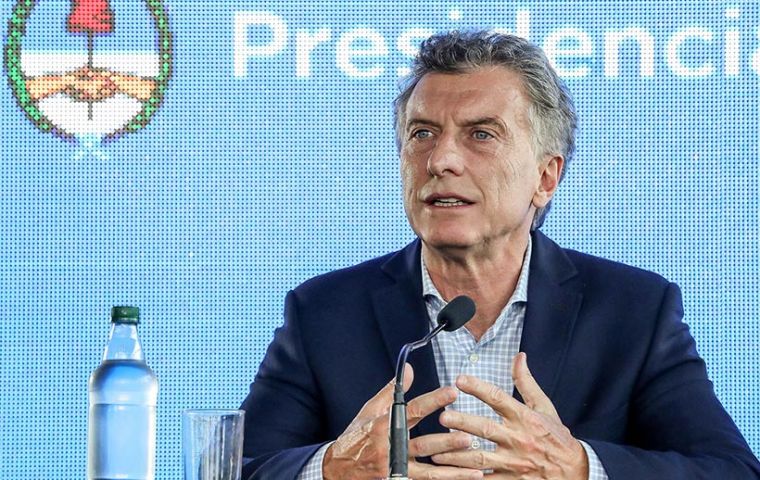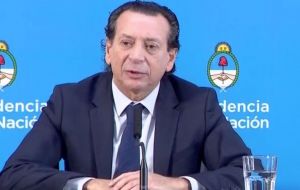MercoPress. South Atlantic News Agency
Argentina: Macri announces the end of sales taxes on basic food products until 2020
 In a televised address to the nation, Macri announced that sales taxes of around 21% would be axed on basic foodstuffs - including bread, sugar, milk, oil, flour, pasta, eggs and rice - to soften the
In a televised address to the nation, Macri announced that sales taxes of around 21% would be axed on basic foodstuffs - including bread, sugar, milk, oil, flour, pasta, eggs and rice - to soften the  In a news conference Labor and Production Minster Dante Sica said the measures would cost about 10 billion pesos (US$ 174.2 million), coming into effect on Friday.
In a news conference Labor and Production Minster Dante Sica said the measures would cost about 10 billion pesos (US$ 174.2 million), coming into effect on Friday. Argentine President Mauricio Macri, trying to recover from a bruising primary election loss, announced on Thursday an end to sales taxes on basic food products until the end of the year in a bid to salvage his re-election prospects and end an economic crisis.
In a televised address to the nation, Macri announced that sales taxes of around 21% would be axed on basic foodstuffs - including bread, sugar, milk, oil, flour, pasta, eggs and rice - to soften the impact of an IMF-backed austerity program on the growing ranks of the poor.
The tax cut represents the boldest of a series of measures Macri has unveiled since his overwhelming defeat on Sunday by the populist opposition, as he seeks to bolster his waning support and revive Latin America’s third-largest economy.
The shelving of the sales taxes was an awkward about-turn for a president who took office in 2015 vowing to slash public subsidies and to correct what he called years of leftist economic mismanagement.
“I hope this will be a relief for the pockets of millions of Argentines,” Macri said. “I will continue working to bring peace of mind so that this electoral process does not affect the daily life of all Argentines.”
In a news conference after Macri spoke, Labor and Production Minster Dante Sica said the measures would cost about 10 billion pesos (US$ 174.2 million), coming into effect on Friday.
Macri has already announced a series of welfare subsidies and tax cuts for lower-income workers since the weekend. He has also promised to raise the minimum wage, temporarily freeze gasoline prices and increase the income tax bracket floor by 20%. On Thursday, he announced plans to help people with inflation-linked mortgages.
On Sunday, presidential candidate Alberto Fernandez trounced Macri by a margin of 15 percentage points, suggesting he could win October’s presidential ballot in the first round.
The result spooked markets on fears of a return to protectionist policies and the end of free-market economic reforms should Fernandez triumph in October. His vice presidential candidate is former populist president Cristina Fernandez de Kirchner.
Argentina is no stranger to financial crises and memories of a painful 2002 debt default - that plunged much of the population into poverty - still linger.
But its latest lurch, in which the peso lost about a quarter of its value in three days, comes amid widespread volatility and fears of a global recession sparked by the U.S.-China trade war, and ongoing protests in Hong Kong.




Top Comments
Disclaimer & comment rules-

-

Read all commentsI note that Alberto Fernandez criticised this move .... even though it is exactly what his party has been proposing as a policy. Did he not know that?
Aug 17th, 2019 - 11:08 pm 0It would be a popular move. We pay 19%VAT on food items here in Chile.
Aug 19th, 2019 - 02:50 am 0Commenting for this story is now closed.
If you have a Facebook account, become a fan and comment on our Facebook Page!